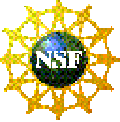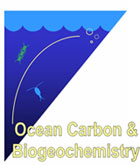Ocean Carbon and Biogeochemistry Scoping Workshop on Ocean Acidification Research
Scripps Institution of Oceanography
La Jolla, CA
Sumner Auditorium
October 9-11, 2007
Dear Colleagues:
The Ocean Carbon and Biogeochemistry (OCB) program solicited nput toward a workshop to promote collaborative research on Ocean Acidification.The OCB had identified Ocean Acidification as one of several Research Priorities, and had kick-started community involvement in planning at a workshop held October 9-11, 2007 at the Scripps Institution of Oceanography in La Jolla, California. The deadline to apply was September 5, 2007.
MOTIVATION: The goal of this workshop was to bring together researchers to discuss potential ocean acidification research projects that support the OCB mission.We specifically wanted to move toward specific implementation strategies to address the many research gaps and unknowns about ocean acidification that have been identified in previous workshops. A list of such unknowns is included at the end of this page.
LOGISTICS AND TIMING: Drs. Victoria Fabry and Chris Langdon volunteered to organize the workshop and solicited additional participation from the community. OCB provided funding for the workshop; funding for participant travel costs was contingent on the number of participants. We anticipated that up to five research topics would be highlighted for in-depth discussion at the workshop.These were selected from your recommendations.
WORKSHOP PRODUCTS: A formal report on the workshop findings, based on participant input, was written and posted on the OCB website after the workshop.
This was an opportunity to explore collaborative research ideas on ocean acidification. We hope that this will provided many of you with information and guidance you need to develop coherent and exciting research proposals under the OCB.
Ocean Carbon and Biogeochemistry http://www.us-ocb.org/
Examples of discussion topics for this meeting (there are, of course, many more such projects, and we will consider all of your recommendations):
- Effects of acidification on the calcium carbonate pump, including production, dissolution and ballasting.
- Linkages between benthic calcification and water column biogeochemistry.
- Effects of ocean acidification on nutrient and trace element availability.
- Biocalcification mechanisms in coral, plankton, etc., as they relate to seawater biogeochemistry.
- Improvements in carbonate system monitoring (key areas, standardization of measurements and techniques, coordination with other observation systems, technological developments, etc.).
- Physiological and calcification studies to better our understanding of the various mechanisms of calcification and the photosynthesis/calcification relationship in autotrophs and in heterotrophs with photosynthetic symbionts.
- Improvements in understanding both the physiological and calcification responses of organisms and communities to ocean acidification at multiple scales (organism, community, ecosystem), and in concert with other factors (e.g. light, nutrients), and the feedbacks to ocean biogeochemistry.
- Laboratory and field studies designed to determine the capacity of organisms to adapt to ocean acidification.
- Changes in benthic calcification rates and the associated impacts on coastal zone sources and sinks of atmospheric CO2.
Workshop Steering Committee
Barney Balch, Bigelow Laboratory for Ocean Sciences
Andrew Dickson, Scripps Institution of Oceanography
*Victoria Fabry, California State University San Marcos
Richard Feely, NOAA/Pacific Marine Environmental Laboratory
Burke Hales, Oregon State University
David Hutchins, University of Southern California
Joan Kleypas, National Center for Atmospheric Research
*Chris Langdon, University of Miami
Chris Sabine, NOAA/Pacific Marine Environmental Laboratory
*Meeting Organizers
Posters
All workshop participants should bring 2-3 ppt slides illustrating their research as applied to ocean acidification. Posters are welcome and participants need to let Mary Zawoysky know if they intend to bring a poster by e-mailing this information to mzawoysky@whoi.edu.
Participant List
Agenda with PowerPoint or PDF files of Presentations from the Workshop
- Agenda Updated October 7, 2007
- Hugh Ducklow, Marine Biological Laboratory: How Will Polar Plankton Ecosystems Respond to Ocean Acidification?
- Mark Green, St. Joseph?s College: Death by Dissolution: The Fate of Carbonate-bearing Organisms in Nearshore Marine Environments in a High CO2 World
- Ulf Riebesell, IFM-GEOMAR, Kiel: Pelagic Mesocosms for Future Ocean Simulations
- Kerim Aydin, NOAA Alaska Fisheries Science Center: Impacts on Fisheries
- Anne Cohen, Woods Hole Oceanographic Institution: Biocalcification Responses to Ocean Acidification: the Interplay of Physicochemical and Physiological Factors
- Gretchen Hofmann, University of California, Santa Barbara: Using Functional Genomics to Explore the Impacts of Ocean Acidification on Calcifying Marine Organisms
- Fred Mackenzie, University of Hawaii: Carbonate Dissolution Under Rising Atmospheric CO2 and Ocean Acidification
- Scott Doney, WHOI: Modeling Challenges for Ocean Acidification
- Danny Harvey, University of Toronto: Ocean Mitigation Strategies
- David Hutchins, University of Southern California: Rising pCO2 and Oligotrophic Ocean Biology: Winners and Losers in the Central Gyres
- Uta Passow, University of California, Santa Barbara: Respiration, Decomposition and Export
- Ilsa Kuffner, U.S. Geological Survey: Ocean Acidification Impacts on Coral Reefs - Changes in Community Structure
- Barney Balch, Bigelow Laboratory for Ocean Sciences: Using Remote Sensing to Assess Ocean Acidification Impacts
- Barney Balch's movie to go with above talk
Related Resources
Please send any related resource links to mzawoysky@whoi.edu.
- Tyrrell, T., B. Schneider, A. Charalampopoulou and U. Riebesell (2007). Coccolithophores and calcite saturation state in the Baltic and Black seas. Biogeosciences Discuss., 4: 3581-3605.
- Special Issue of Current on Ocean Acidification - From Ecological Impacts to Policy Opportunities
Permission has been granted to the Ocean Carbon and Biogeochemistry Office to post the special issue of Current: The Journal of Marine Education featuring: "Ocean Acidification--From Impacts to Policy Opportunities" published by The National Marine Educators Associations (NMEA). For more information about the NMEA, please visit their website
at www.marine-ed.org. - Harvey, L.D.D. (2008). Mitigating the atmospheric CO2 increase and ocean acidification by adding limestone powder to upwelling regions. Journal of Geophysical Research-Oceans113, C04028, doi:10.1029/2007/JC004383.






